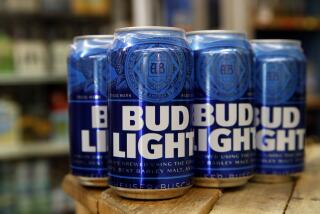100 Bottles of Beer on the Wall : UNDER THE INFLUENCE: The Unauthorized Story of the Anheuser-Busch Dynasty <i> By Peter Hernon and Terry Ganey</i> ; <i> (Simon & Schuster: $25.95; 461 pp.) </i>
- Share via
It is rare that one encounters a book that is simultaneously as fascinating and as flawed as this oddly compelling account of the Anheuser-Busch beer barons and their assorted wives, mistresses and star-crossed children.
Fascinating? There are enough suicides and other violent deaths--not to mention divorces, extramarital affairs, parent-child estrangements, high-level political finagling, accusations of Nazi sympathies and stupefyingly lavish self-indulgences--to make Robert Ludlum, Harold Robbins and Judith Krantz all sob with envy.
Flawed? The book has more hyperbole, speculation and portentous foreshadowing than there are hops in St. Louis and Milwaukee combined.
Chapters and sections in this book repeatedly end with such ominous observations as:
--”His son gave a pistol to Gussie’s son, a gift that would have tragic repercussions.”
--”He purchased even more weapons, one of which he would later pick up in a moment of desperation.”
--”Once he strode onto the scene, the dynasty would never be the same.”
--”As for Lilly, her ordeal in Key West wouldn’t be her last run-in with federal agents.”
This might be dismissed as merely an unfortunate stylistic tic--an inability to write smooth transitions, compounded by an exaggerated sense of the (melo)dramatic--but it is all too typical of the basic “gee whiz” tone of a book that hypes a tale in no need of hyping.
Adolphus Busch--born in Germany, the second youngest of 22 children, known as “the Prince”--founded a dynasty that became one of the wealthiest and most bizarre in the world. Busch himself is the man who “brought bottled beer to the masses.” One of his descendants was later presumed murdered. Two were kidnaped, one by an armed suitor who threatened to kill himself in front of her if she didn’t marry him that very day. Another Busch bought a major league baseball team, the St. Louis Cardinals. Yet another spoke and gestured so vigorously that she once broke her wrist while banging on the dinner table during conversation.
The beer that Busch began with--originally made by his partner, Eberhard Anheuser--was so bad that customers often spit it back over the bar. Adolphus himself preferred wine to beer and often referred to his showcase beer, Budweiser, as “dot schlop. “ But he was determined to improve its quality and he passed along this determination to future generations; Anheuser-Busch now brews what the book says is “arguably the most consistently excellent beer ever mass-produced.” Certainly it is the most successful; the company sells almost 44% of all beer brewed in the United States.
Peter Hernon and Terry Ganey, reporters for the St. Louis Post-Dispatch, have done a remarkable job of unearthing nugget after nugget of information about how Busch and his progeny created and sustained their empire, fought off competitors and Prohibitionists alike and lived like royalty, a law unto themselves, in sybaritic splendor.
A simple, straightforward account of their financial maneuverings, political infighting, family conflicts and tragic fascination with firearms would keep any reasonably sentient reader riveted to the page. The story of the Busch family, unembellished, is an unparalleled tale of greed, power, sex and disaster. It’s also a tale made to order for two journalists to tell, journalistically. But Hernon and Ganey have chosen to overstate and speculate in a way that would make any decent newspaper editor cringe and scream, “Rewrite.”
Rumors and implications of wrongdoing by the Busches are passed along--uncritically, anonymously--often in language that is almost a parody of bad--irresponsible--journalism. Various events are described as “probably” having happened for this or that reason. Someone “speculated” that something else happened. August A. Busch III is said to have “led the palace coup that forced (his father) Gussie from the throne of Anheuser-Busch--stabbed him in the back, one family member reportedly said.”
At one point, the authors devote two paragraphs to a rumored extramarital affair between oneBusch and a “vivacious redhead” who ran a chic dress boutique in St. Louis, only to conclude, “There was no evidence, however, that August A. and Nellie even knew each other.”
“Under the Influence” is filled with amusing and appalling anecdotes, and more than a few stories that elicit goose bumps. One such instance is the chilling account of Adolphus’ 74-year-old wife Lilly fleeing Germany in 1918 and being searched for secret codes by U.S. agents and a male doctor, who made “a very thorough examination of her vagina and womb.”
If you can suspend your critical faculties long enough, this book can be rewarding in what it reveals about big business and small-minded people. But, too often, the authors foolishly get in the way and distract you from the intriguing business at hand. They refuse to let their generally superb material speak for itself.
Although the Kennedys, it has oft been said, are America’s uncrowned Royal Family, Hernon and Ganey would have you believe, for example, that “not even the Kennedys can compete with . . . (the) influence” of the Busch family.
Poppycock.
There is no gainsaying the enormous impact the Busches and their beers--Budweiser, Michelob, Busch, Anheuser-Busch, Natural Light, Busch Bavarian and all their sudsy offspring--have had on American popular culture and American drinking habits. But have the Busches, for all their beer, really been more influential than the Kennedys? Or the Rockefellers? How about the Fords? Has beer really had a greater effect on our society than the automobile and the assembly line?
If hyperbole is your cup of brew, this book’s for you.
More to Read
Sign up for our Book Club newsletter
Get the latest news, events and more from the Los Angeles Times Book Club, and help us get L.A. reading and talking.
You may occasionally receive promotional content from the Los Angeles Times.










